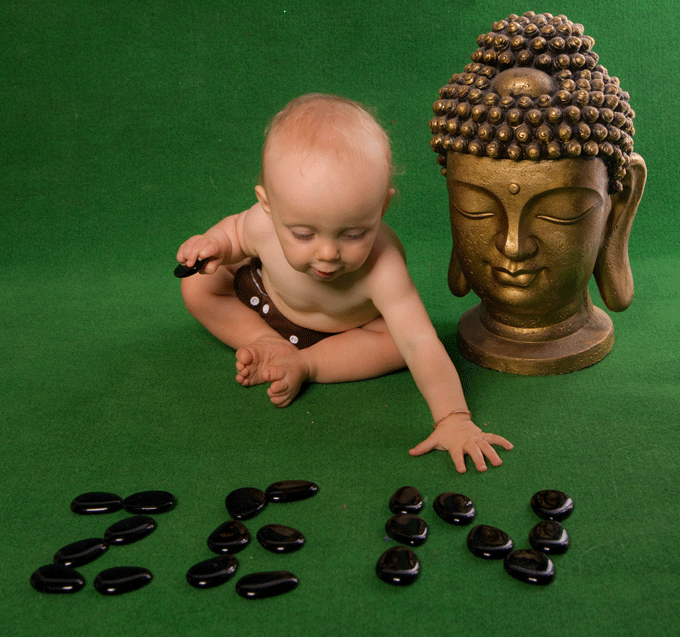There are days when being a mom makes me feel like the luckiest woman in the world. I feel blessed to have two beautiful children who are thriving under my care, and the rewards seem endless. Other days…well, I don’t have to tell you about other days. Whether they involve temper tantrums, sleep deprivation or just the general chaos that often comes with parenthood, those are the days that try a woman’s soul.
Being a mother is a life-transforming event that can rock even the most even-keeled, self-assured female to the core. Suddenly you aren’t who you thought you were, and the rules that once governed your world are turned upside down by the demands of a tiny yet emotionally powerful little person. Right after my daughter was born, I found it hard not to lose myself in my new job as her caregiver. Transitioning from full-time career woman to stay-at-home mom working part-time was not easy for me. As my ego made room for the sacrifices I needed to make for my child, I struggled to redefine myself and my role in the world. And sometimes, I found it difficult to surrender to this little creature who needed me around the clock. Those challenges, along with the recognition that I was raised by loving yet anxious parents, motivated me to mother my own children with a more centered, relaxed approach.
Enter Buddhism.
It’s an enlightening religion on its own, but over the last few years I’ve sought comfort in many of its wise principles. Here are 8 valuable parenting lessons that Buddhism has taught me. If you’re like me and need a reminder, now and then, that everything’s going to be OK and that you’ll make it through to your kids’ high school graduation without cracking, read up. These philosophies will help you embrace the changes that motherhood brings and enjoy life as you now know it.
Being a mother is a life-transforming event that can rock even the most even-keeled, self-assured female to the core. Suddenly you aren’t who you thought you were, and the rules that once governed your world are turned upside down by the demands of a tiny yet emotionally powerful little person.
1. Slow down. As moms, we often view our day as one big to-do list. We’re rushing here and there, from the grocery store to school to ballet class, and back home to cook dinner. We might be eager to finish up some work we brought home from the office, so we sometimes find ourselves hurrying through bedtime stories and snuggles. But Buddhism reminds us to live more mindfully, to be completely in the present and alive in every moment, especially with the people we love.
Writes Sarah Napthali in her book Becoming a Mindful Parent: Buddhism for Mothers of Young Children, “If we practice Buddhist mindfulness—living with awareness of what we are doing as we are doing it—throughout our day, then no moment is too small for our attention.” As a high-energy person, this has been hard for me. But I find that when I put down the phone or the laundry, and get on the floor with my kids, look them in the eye and offer them my undivided attention, they’re deliriously happy for the rest of the day. And guess what? So am I.
If you’re having trouble remembering what it’s like to be in the moment, just turn to your kids for guidance. Ever notice how an inquisitive toddler often acts as if there’s nowhere in the world she’d rather be than right here, right now? How she stops to examine every sidewalk crack, every weed growing along the side of the road, every doggy passing by? Children reconnect us to simple wonders of everyday life and naturally have the “beginner’s mind” that Zen Buddhists strive to cultivate. Slowing down isn’t easy when you’re a mom, but it helps you savor the details that are more important than you think.
2. Surrender to life’s imperfections. The first of the four noble truths taught by the Buddha is that life is fraught with dukkha. Modern interpretations define that as the suffering, stress, anguish and other not-so-pleasant parts of life. But the true meaning of dukkha is the gap between what is happening and what we wish were happening, large or small. Wish your house were cleaner but don’t have time to clean it? Hoping your kid would sleep through the night? Agonizing over that baby weight that won’t come off? Children and motherhood make for lots of dukkha. For inner peace we must surrender to that dirty house, or that lack of sleep, or that cute little potbelly. We can try to fix it, but for now it is what it is and we must live with it. We mustn’t be so hard on ourselves because life isn’t perfect.
The true meaning of dukkha is the gap between what is happening and what we wish were happening.
3. Be patient. The cause of dukka is desire. Aspiring or wanting isn’t bad; in fact, it can lead to positive change. But desire translates to all that pesky clinging and demanding and attachment that, if unrequited or unfulfilled, leads to suffering. Buddhism cultivates the idea of patient acceptance. The idea is that you should challenge yourself to do your best, but accept the way life unfolds. Be grateful for what is going well and don’t let negative thoughts and attitudes shape your life.
Say your baby isn’t eating. That causes you pain. But the suffering doesn’t come from the fact that your child spits out his pureed peas. It’s stemming from your feelings of guilt, or your thinking that you’re an unfit mother because your child isn’t digging mealtime. Stop blaming yourself, do what you can do to help the situation, but as long as your child is healthy and thriving, patiently accept the fact that the process may take time.
4. Look at problems from a distance. When our problems feel out of control, argues the Dalai Lama in The Art of Happiness, we should step back and examine them from a distance. When my daughter was only 2 and we’d just moved to San Francisco, I got caught up in the whole preschool application process. Every park and playgroup I went to, all the moms talked about is which schools they had already applied to, how tough it was to get in, and how I had better get cracking because I hadn’t applied during my pregnancy. The voice in my head said, “I am the worst mom for not having thought about this before we moved. Now my child will be doomed to a bad preschool and end up not getting into a good college.”
Of course, sleep deprivation and the stress of our recent cross-country move probably contributed to these negative thoughts. But once I stepped back, took a deep breath and looked at the big picture, I was able to reassure myself that my daughter would turn out just fine, no matter what school she attended. Remember: Motherhood is a marathon, not a sprint.
5. Realize you’re not who you think you are. For a few years into this parenting thing, it really bothered me when people referred to me as “just a stay-at-home mom.” It didn’t seem to matter that aside from mothering, I was also freelancing, running a household, heading up the parent association at my kids’ school and chauffeuring little people around all day. The fact that I was no longer sitting in an office wearing a pencil skirt reduced my status in the world significantly, and that did not sit well with me. That was because prior to kids, my identity was wrapped up in my career and personal interests and, even though I wouldn’t have admitted it at the time, the value that society placed on me.
But Buddhism teaches that we do not exist in the way we think we do—as humans, we have a false sense of a separate and enduring self. Our true Buddha nature is quite different from what we thought “we” were: It’s not our egos, our titles and accomplishments, our possessions, or even our thoughts and feelings. Our true underlying nature exists in every moment, deep within our core. When it’s awakened, we become more compassionate, loving, spacious and at peace with ourselves. We can forgo our ego-driven actions and be the calm, centered and wise mothers our children need us to be.
When our Buddhist nature is awakened, we become more compassionate, loving and at peace with ourselves. We can forgo our ego-driven actions and be the calm, centered and wise mothers our children need us to be.
6. Let your children be who they’re meant to be. Parenting today is full of more anxiety than ever before. Kids are over-scheduled with lessons and classes designed to train them to be the next pop singer, soccer star and Harvard grad rolled into one. Without knowing it, we can project our own fantasies onto our children, like when we give them piano lessons because we always wanted to play (I admit, guilty as charged). But, writes Napthali, “for our children to grow into their true selves, we need to allow them the space to blossom into who they truly are.” This doesn’t mean we should let them run amok, without any boundaries, training or hard work. It just means, as Napthali so beautifully puts it, we should let them be “free to unfold in their own way.”
What does this mean? That, instead of getting attached to our own ideas of who our kids should be, we should let their interests and passions point them—and us—toward their true path. If we pay close attention to them when they’re little and exploring the world, we can help them discover themselves. For example, if your toddler loves to draw on everything, including the walls, give him a box of finger paints and some art lessons. It’s better than forcing him to play football because your husband was a quarterback wannabe.
A friend of mine recently gave up lamenting the fact that her son hates sports and just wants to stay in the house building towers with Legos. Instead of mourning the tennis star she dreamed he’d become, she bought him a T-shirt that says “Indoorsy,” signed him up for building lessons, and dreams of the day when he’ll design her retirement home. Did I mention that the Buddha also had a taste for wit and humor?
7. Realize we’re all connected. I was recently discussing with one of my good friends (and one of the best moms I know) the fact that, to a parent, the most difficult Buddhist concept to embrace is that of detachment. But in reality, Buddhism doesn’t preach detachment from our children, but rather non-attachment. This, of course, means allowing our kids to be themselves and loving them as they are (see #6). But it also means accepting that our offspring do not “belong” to us exclusively. One of Buddhism’s most beautiful teachings is that we are all connected in some way to the infinite universe. If you take that view, you’ll understand that your children are not your possessions, but simply travel through you on the way toward their own path in life. Our job, while we are raising them, is to offer them unconditional love, teach them important life skills and help them realize their full potential.
An enlightened parent also strives to practice the Buddhist concept of Equanimity, which means looking at all things openly and equally, and engaging in the greater world around you. Show your kids you care about other children and other families by volunteering together at a local food bank. Say “yes” when a friend needs a couch to sleep on, or deliver a home-cooked meal to a family at school that’s experiencing tough times. These community-minded actions teach your children that although you love them unconditionally, they are not the center of the universe. Equanimity demonstrates the important concept of community and helps kids learn to trust people outside their own “clan,” so that one day they’ll have the courage to leave home, make new connections and forge their own way in the world.
8. Be kind to yourself. The love and compassion that Buddha preaches doesn’t apply only to how you treat other people, but also to how you care for yourself. On a daily basis, make sure you’re being good to the person in charge of raising your children. Exercise. Nourish your body with nutritious food. Meditate or practice yoga when you’re feeling overwhelmed. Staying healthy in body and mind enables you to be the best parent you can possibly be.
In Buddhism, being kind to yourself also means listening to your inner voice. When it comes to making decisions about your child, let your instincts guide you. If you’ve been paying close attention, staying in the moment whenever possible, and practicing the art of patient acceptance, you’ll know exactly what to do when your Buddha Baby needs you most.





















2014/08/07 at 4:24 am
Thank you for this! Great guidance for moms.
2014/08/07 at 11:23 pm
Well put. Great ideas to put into action.
2014/09/11 at 8:50 pm
LOVED THIS!! Namaste!!
2014/10/04 at 2:31 pm
Love this! Going to share out now. Thank you for such a beautiful story. Good reminders in all things living.
2014/10/04 at 9:01 pm
Thank for writing this! Loved the distinction between detachment and nonattachment–I didn’t really get that before.